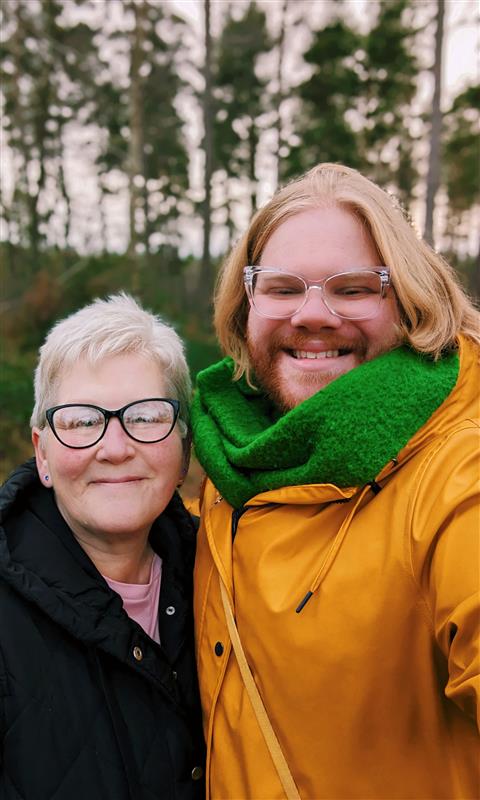Question 3: Was there ever a moment you felt completely helpless or scared, and how did you manage it?
Mum: Yeah. At one point you said you wanted to die.
Tim: No, I didn’t.
Mum: Yes, you did. You said you didn’t want to be a diabetic anymore, and I was quite fearful at that point that you’d do something… you know.
Tim: You’ve made this up. I don’t remember saying any of this?
Mum: I remember it well. It stuck in my mind. I contacted the paediatric nurse, the one who was your nurse for your diabetes, and she just offered me support. We got through it. It was quite a low period.
If you or someone you know is struggling with mental health, please reach out to a healthcare professional or support service.
Question 4: How has my diabetes changed the way you see health, food, or daily life?
Mum: Through your development and growth, I’ve seen how hard it is to achieve a good balance with diabetes. It’s made me think very carefully about my own type 2 diabetes. Before, I didn’t take it seriously enough to want to bother with it, but now I try hard to keep my glucose levels under control.
Question 5: What are you most proud of when it comes to managing diabetes as a family?
Mum: I’m more proud of you, really, because you’re the one that puts us on the straight and narrow. You explain things to us; you educate us in a way that even though we’ve been with it for many, many years, you’ve found out so much about it as a person and developed it. You then pass that knowledge on to us.
Question 6: If you could go back and tell yourself one thing about this journey, what would it be?
Mum: Perhaps be more clued up. Find out more about it, and then we could have handled it a little bit better. Maybe be a bit more supportive, maybe? Not just for you, but for me too. I don’t mean type 1, but with my type 2, I was… I wouldn’t say blasé, but I thought, “Oh, it’s not that serious,” and it wasn’t until later in life that I really found out what could happen if you didn’t treat it correctly.
Question 7: What’s the weirdest, most chaotic diabetic moment you’ve experienced with me?
Mum: I think it was when we were in the caravan, and you had high glucose levels. You were sleeping in the awning with your sister, and your glucose level was 32 mmol/L. You were acting so strangely, as if you’d been on drugs almost. You were panicking a little bit, but it was also funny because you were acting so strangely.
Question 8: Have you ever panicked over something that turned out to be nothing?
Mum: I think it was more about your attitude and how I handled it. Was I giving you the correct advice? Was I being supportive enough? Sometimes I just wanted to be there for you, but maybe I wasn’t always.
Perhaps I was trying to do the right thing when it came to the health side, but I didn’t really think about what was happening mentally, the impact it was having on you as a child.
Question 9: What’s the most “mum” thing you’ve ever done to help me manage diabetes?
Mum: We were talking about this the other day. You joined Scouts and you were going on your first camping trip. I thought the camp leaders wouldn’t feed you… So, I sent you off to camp with…
Tim: An entire new box of cereal.
Mum: Yes! Two pints of milk, and ridiculous amounts of snacks.
Tim: Yeah, everyone laughed at me.
Mum: When you went abroad, I even asked the Scout leaders to come to our house. I was concerned you wouldn’t be able to get snacks or treats you needed. And then they said, “Gail, there’s a Tesco next door to the camp.” That was quite a mumsy thing to do.
Question 10: Do you think you could survive a day in the shoes of a type 1 diabetic?
Mum: I don’t think I could. Because I didn’t class my type 2 as serious enough, I think I would really struggle. You have to do your glucose levels more often than I do. I think I’d find it really, really difficult. I suppose, in a way, I was idle. It was only the introduction of CGMs that actually made me take my glucose levels more seriously.
Tim: So, do you think you could survive a day in my shoes?
Mum: No, I don’t.
Question 11: Do you have any advice for parents with children who have type one diabetes?
Mum: Learn as much as you can. Knowledge is the key. Support your child 100% physically and mentally. You're going to have good days and bad days, and bad days will feel worse, naturally bad, but the good days will be there.
